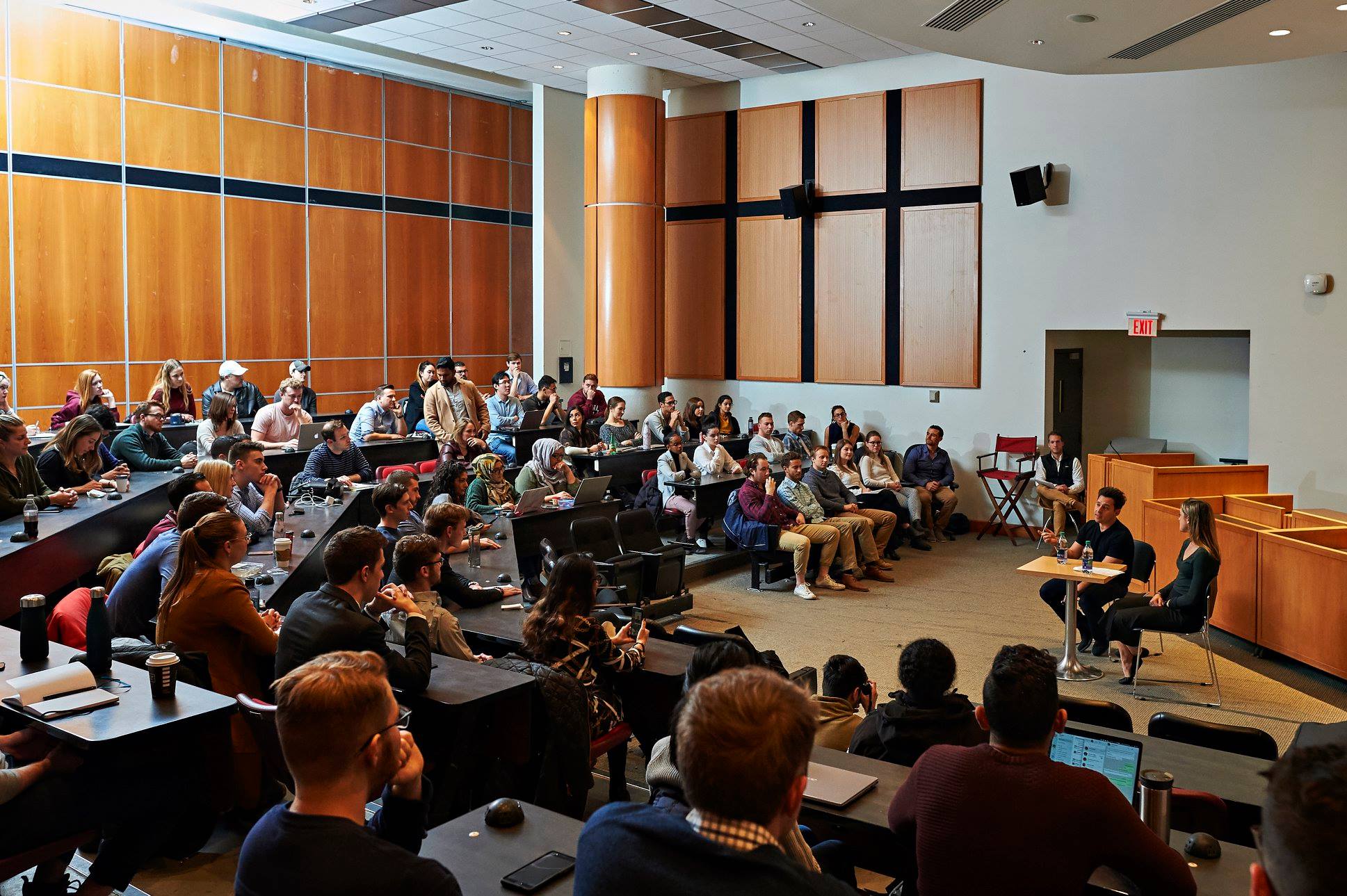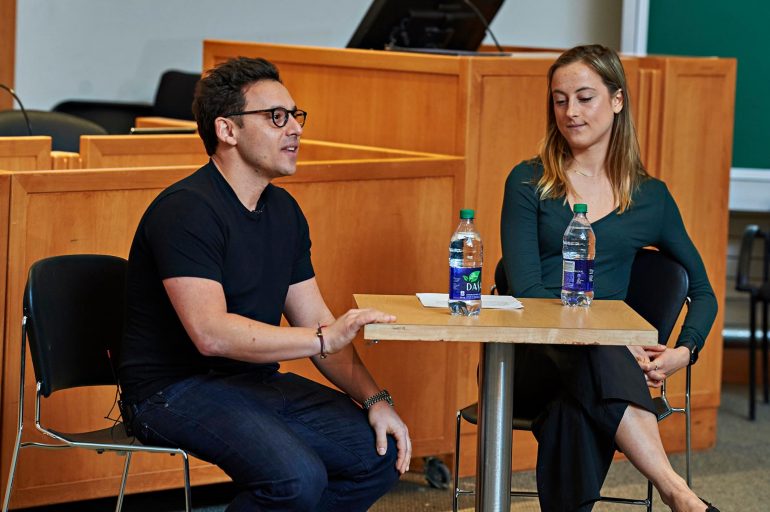Last week, the University of Ottawa law faculty’s All Sorts of Torts club and the Telfer School of Management’s Entrepreneur’s Club invited Harley Finkelstein to discuss how he transitioned from being a lawyer to leading one of the world’s fastest growing tech companies – Shopify.
Speaking to a room full of MBA and law students, Finkelstein, COO of Shopify, described how his drive for entrepreneurship, since he was seven-years-old, led him to join the Shopify team in 2010.
“I got this weird confidence when I was really young that entrepreneurship was something I could do.”
“I realized that I liked the idea of starting businesses,” said Finkelstein. “My dad would make me business cards for every silly idea I had. I got this weird confidence when I was really young that entrepreneurship was something I could do. Entrepreneurship, being this incredible way to solve problems, was what I wanted to spend my life doing.”
Throughout his teenage years and into his undergraduate studies, Finkelstein explored entrepreneurship through launching his own businesses. At 13-years-old, Finkelstein was DJ’ing at special events and Bar Mitzvahs, and at 17, he founded a T-shirt company while attending McGill University. When Finkelstein realized that he wouldn’t always have a competitive advantage with his T-shirt business, he took the advice of his mentor, Ottawa lawyer, Philip Rimer, and decided to attend law school.
RELATED: Foteini Agrafioti, Harley Finkelstein among tech leaders in Canada’s Top 40 Under 40
“Phil hinted at the idea that I should consider going to law school because it might help provide me with a better platform for entrepreneurship. I could write better, think better, negotiate better, and be more articulate,” said Finkelstein.
Building Shopify at a coffee shop
It was while he was attending law school in Ottawa that Finkelstein met Tobias Lütke, current CEO and co-founder of Shopify. The two met at a coffee shop, where they would get together with other engineers and creative minds to discuss entrepreneurial ideas, such as the software that ended up becoming Shopify.
“People like myself wanted to use Tobi’s software to sell products like T-shirts. I ended up becoming one of Shopify’s first customers,” said Finkelstein.
While Finkelstein initially took the traditional pathway of a law student, working a summer job at Ottawa-based law firm, LaBarge Weinstein, and articling for 10 months at a Toronto law firm, he knew this wasn’t for him. What he really wanted was to pursue entrepreneurship by “creating much with nothing” and “doing a lot with little.”
“I’m doing my life’s work. I don’t necessarily regret any steps I took to get to this point now.”
After finishing his articling program, Finkelstein reached out to Lütke to see whether he could help build a business around Lütke’s online ecommerce software. Eventually, Finkelstein joined the company in a hybrid role where he was both general counsel and looked after the business side of Shopify.
“I’m doing my life’s work. I don’t necessarily regret any steps I took to get to this point now,” said Finkelstein, adding how excited he was to work with “brilliant minds” building an incredible piece of software.
“My job was to add a lot of value. Part of any good startup story is you wear a lot of different hats. I tried to protect those geniuses from stuff that wasn’t going to be value-add,” he said. “People get caught up in title and salary, and the problem with doing that is pulling future gains at a discount. What I brought to Shopify was that I was relentless. I was loud.”

During his talk, Finkelstein described to the audience the successes of Shopify to date, including that the company has 800,000 stores on its platform; how seven percent of all products sold on Black Friday were sold through Shopify; and that the company currently has about 4,500 employees across 12 offices around the world.
He also noted how Shopify’s $100 million Series C funding round led by OMERS Ventures in 2013 helped take the company to the next level, eventually leading Shopify to announce its public filing in 2015.
“That changed things. The Series A was $7 million. The Series B was $15 million. Those are big numbers but it didn’t necessarily give us the money we needed to really build what we thought could be Canada’s next great company. But by the Series C, it was like, let’s go hire a CFO, let’s hire a CMO. Let’s hire people that know what they’re doing as opposed to just being scrappy all the time.”
Today, Finkelstein said Shopify strives to continuously bring in experts to help the company’s executive team broaden its skill set with the aim of scaling Shopify.
“We agree that we have a growth mindset. We all believe we have to requalify for our jobs. We serve at the honour of Shopify,” he explained.
“The common thread [is that] every year we re-qualify for our job. I think that if you just have that mentality that everyone, Tobi included, has to requalify for their job on an annual basis, it forces you to get really good or really comfortable with being uncomfortable,” Finkelstein said, adding that Shopify currently has 15 coaches that help the executive team improve.
Advice for future entrepreneurs
For people who are looking to become entrepreneurs or don’t plan on taking traditional education or career paths, Finkelstein wrapped up his talk with a few pieces of advice.
Finkelstein expressed that being relentless can lead to success, and it’s crucial for startups to embrace their differences.
“The best companies I’ve encountered and invested in, if you look at their leadership team, they would not be friends in high school. I was class president. Tobi was playing video games,” said Finkelstein. “I think what I brought was a unique perspective they didn’t have and this unrelenting push. Once we realized that we have the best product in the world, I felt it was my job to monetize it. It’s on me to make sure people use and pay for it.”
RELATED: #GlobeSBS16: Shopify’s Harley Finkelstein on how large companies maintain startup culture
Finkelstein also addressed how valuable mentorship can be for personal and professional growth. He noted that the best way to secure strong mentors is by reaching out to people who inspire you, and telling them there’s a lot you can learn from them.
“Mentorship is something no one teaches us and it’s one of the most important life skills to acquire.”
“I try to acquire different mentors and people that I look up to and respect. Someone’s not your mentor just because you sent them an e-mail. It’s a commitment,” said Finkelstein. “Send a modest, humble e-mail saying ‘Can I buy you coffee for 10 minutes?’ and the good ones will respond. Mentorship is something that no one teaches us and it’s one of the most important life skills to acquire.”
Finkelstein wrapped up his advice by suggesting letting go of ego and striving to learn from, and work with, people who are smarter than you.
“I’ve learned to hire people better than me. I struggled with this in the early days because I thought if I hire people better than me, I’ll put myself out of a job. But the more people I hire [that are] better than me, the better I become.”
Overall, Finkelstein stressed that traditional educational pathways may not be for everyone, but pursuing different forms of education can certainly equip aspiring entrepreneurs with the skills needed to disrupt industries and build tech giants like Shopify.


